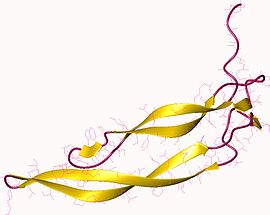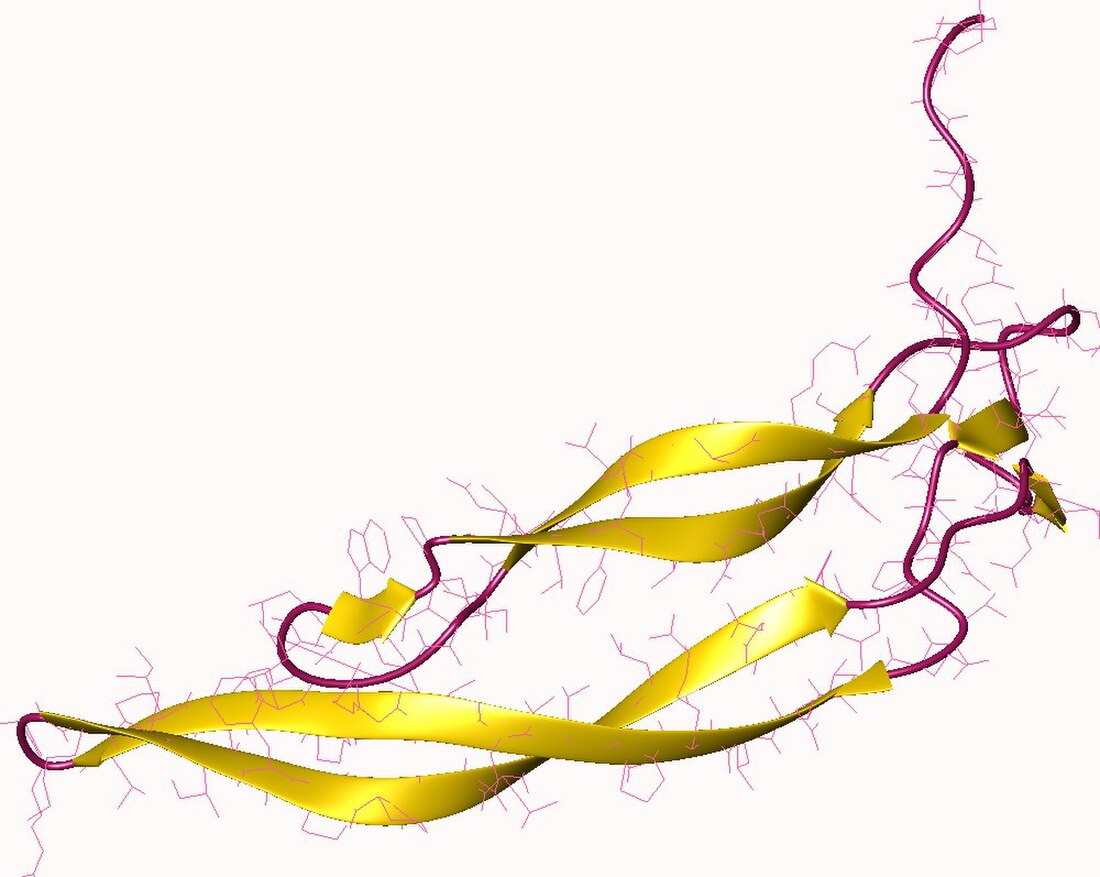血小板衍生生長因子(Platelet-derived growth factor,PDGF)為一種生長因子,可以調控細胞的生長和分化,且在血管新生上扮演重要角色。未控制的血管新生常常導致癌症。在化學上PDGF為醣蛋白二聚體,且有A和B兩種不同形式,可組合為AA、AB和BB等結構。
PDGF[1][2]是一種有效的間充質細胞絲裂原,包含纖維母細胞、平滑肌、神經膠細胞。在小鼠和人類中,PDGF信號網絡都包括四種配體:PDGFA 到 PDGFAD,與兩個受體:PDGFRA和PDGFRB。所有PDGF都表達到胞外,並通過二硫鍵連接形成同元二聚體,但只有PDGFA和B可以形成有功能的異元二聚體。
PDGF在被合成出來之後,會先貯存在血小板中的α顆粒當中[3],直到受到刺激後才釋放出來。另外,平滑肌細胞、活化的巨噬細胞,和上皮細胞等多種細胞也會製造PDGF[4]。
分類
PDGF擁有五種亞型
There are five different isoforms of PDGF that activate cellular response through two different receptors. Known ligands include A (PDGFA), B (PDGFB), C (PDGFC), and D (PDGFD), and an AB heterodimer and receptors alpha (PDGFRA) and beta (PDGFRB). PDGF has few other members of the family, for example VEGF sub-family.
機制
The receptor for PDGF, PDGFR is classified as a receptor tyrosine kinase (RTK), a type of cell surface receptor. Two types of PDGFRs have been identified: alpha-type and beta-type PDGFRs.[5] The alpha type binds to PDGF-AA, PDGF-BB and PDGF-AB, whereas the beta type PDGFR binds with high affinity to PDGF-BB and PDGF-AB.[6] PDGF binds to the PDGFR ligand binding pocket located within the second and third immunoglobulin domains.[7] Upon activation by PDGF, these receptors dimerise, and are "switched on" by auto-phosphorylation of several sites on their cytosolic domains, which serve to mediate binding of cofactors and subsequently activate signal transduction, for example, through the PI3K pathway or through reactive oxygen species (ROS)-mediated activation of the STAT3 pathway.[8] Downstream effects of this include regulation of gene expression and the cell cycle. The role of PI3K has been investigated by several laboratories. Accumulating data suggests that, while this molecule is, in general, part of growth signaling complex, it plays a more profound role in controlling cell migration.[9] The different ligand isoforms have variable affinities for the receptor isoforms, and the receptor isoforms may variably form hetero- or homo- dimers. This leads to specificity of downstream signaling. It has been shown that the sis oncogene is derived from the PDGF B-chain gene. PDGF-BB is the highest-affinity ligand for the PDGFR-beta; PDGFR-beta is a key marker of hepatic stellate cell activation in the process of fibrogenesis.[來源請求]
功能
PDGFs are mitogenic during early developmental stages, driving the proliferation of undifferentiated mesenchyme and some progenitor populations. During later maturation stages, PDGF signalling has been implicated in tissue remodelling and cellular differentiation, and in inductive events involved in patterning and morphogenesis. In addition to driving mesenchymal proliferation, PDGFs have been shown to direct the migration, differentiation and function of a variety of specialised mesenchymal and migratory cell types, both during development and in the adult animal.[10] Other growth factors in this family include vascular endothelial growth factors B and C (VEGF-B, VEGF-C)[11][12] which are active in angiogenesis and endothelial cell growth, and placenta growth factor (PlGF) which is also active in angiogenesis.[13]
PDGF plays a role in embryonic development, cell proliferation, cell migration, and angiogenesis.[14] Over-expression of PDGF has been linked to several diseases such as atherosclerosis, fibrotic disorders and malignancies. Synthesis occurs due to external stimuli such as thrombin, low oxygen tension, or other cytokines and growth factors.[15]
PDGF is a required element in cellular division for fibroblasts, a type of connective tissue cell that is especially prevalent in wound healing.[15] In essence, the PDGFs allow a cell to skip the G1 checkpoints in order to divide.[16] It has been shown that in monocytes-macrophages and fibroblasts, exogenously administered PDGF stimulates chemotaxis, proliferation, and gene expression and significantly augmented the influx of inflammatory cells and fibroblasts, accelerating extracellular matrix and collagen formation and thus reducing the time for the healing process to occur.[17]
In terms of osteogenic differentiation of mesenchymal stem cells, comparing PDGF to epidermal growth factor (EGF), which is also implicated in stimulating cell growth, proliferation, and differentiation,[18] MSCs were shown to have stronger osteogenic differentiation into bone-forming cells when stimulated by epidermal growth factor (EGF) versus PDGF. However, comparing the signaling pathways between them reveals that the PI3K pathway is exclusively activated by PDGF, with EGF having no effect. Chemically inhibiting the PI3K pathway in PDGF-stimulated cells negates the differential effect between the two growth factors, and actually gives PDGF an edge in osteogenic differentiation.[18] Wortmannin is a PI3K-specific inhibitor, and treatment of cells with Wortmannin in combination with PDGF resulted in enhanced osteoblast differentiation compared to just PDGF alone, as well as compared to EGF.[18] These results indicate that the addition of Wortmannin can significantly increase the response of cells into an osteogenic lineage in the presence of PDGF, and thus might reduce the need for higher concentrations of PDGF or other growth factors, making PDGF a more viable growth factor for osteogenic differentiation than other, more expensive growth factors currently used in the field such as BMP2.[19]
PDGF is also known to maintain proliferation of oligodendrocyte progenitor cells.[20][21] It has also been shown that fibroblast growth factor (FGF) activates a signaling pathway that positively regulates the PDGF receptors in oligodendrocyte progenitor cells.[22]
歷史
PDGF是第一種被鑑定的生長因子[23],引領了許多生長因子信號通路的研究[來源請求]。
藥物
Recombinant PDGF is used to help heal chronic ulcers and in orthopedic surgery and periodontistry to treat bone loss.[24]
研究
Like many other growth factors that have been linked to disease, PDGF and its receptors have provided a market for receptor antagonists to treat disease. Such antagonists include (but are not limited to) specific antibodies that target the molecule of interest, which act only in a neutralizing manner.[25]
The "c-Sis" oncogene is derived from PDGF.[21][26]
Age related downregulation of the PDGF receptor on islet beta cells has been demonstrated to prevent islet beta cell proliferation in both animal and human cells and its re-expression triggered beta cell proliferation and corrected glucose regulation via insulin secretion.[27][28]
A non-viral PDGF "bio patch" can regenerate missing or damaged bone by delivering DNA in a nano-sized particle directly into cells via genes. Repairing bone fractures, fixing craniofacial defects and improving dental implants are among potential uses. The patch employs a collagen platform seeded with particles containing the genes needed for producing bone. In experiments, it new bone fully covered skull wounds in test animals and stimulated growth in human bone marrow stromal cells.[29][30]
PDGF家族
Human genes encoding proteins that belong to the platelet-derived growth factor family include:
- FIGF
- PDGFA; PDGFB; PDGFC; PDGFD
- PGF
- VEGF; VEGF41; VEGFB; VEGFC;
參見
- Platelet-activating factor
- Platelet-derived growth factor receptor
- atheroma platelet involvement in smooth muscle proliferation
- Withaferin A potent inhibitor of angiogenesis
參考文獻
外部連結
Wikiwand in your browser!
Seamless Wikipedia browsing. On steroids.
Every time you click a link to Wikipedia, Wiktionary or Wikiquote in your browser's search results, it will show the modern Wikiwand interface.
Wikiwand extension is a five stars, simple, with minimum permission required to keep your browsing private, safe and transparent.

